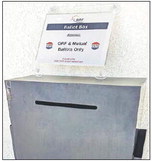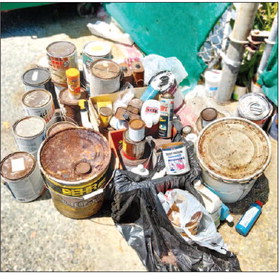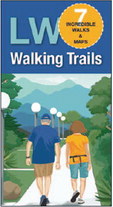Athens Services Food Composting Program
Editor’s Note: The following is a reprint of information about the new food scrap collection program that was instituted late last year. Some Mutuals report that compliance has been spotty, and more outreach may be needed. To that end, the LW Weekly is reprinting the information that Athens supplied when the program debuted and a chart that residents can cut out of the paper for easy reference.
Athens Services is partnering with LW to implement a food scrap collection program, per Senate Bill 1383.
This new mandate requires residents in LW and across California to place all food scraps and food-soiled paper (100% fiber-based) into a special container.
The new organics carts were delivered in October to all Mutual trash collection areas.
The weekly service began in early November. That’s when residents started separating their waste in a new way.
WHAT’S CHANGING?
You will be able to use your green organics container for the collection of green waste, food scraps, and 100% fiber-based, food-soiled paper. (Green waste includes resdients’ personal garden and grass clippings, not LW landscapers, who have their own green waste program.)
DOES THAT INCLUDE FOOD SCRAPS? Yes, Athens will accept all types of food scraps. The American Organics compost facility converts organics waste into nutrient-rich soil amendment.
Athens Services has owned and operated the American Organics composting facility since 2009. Today, it is renowned as one of Southern California’s highest-tech composting facilities with state-of-the-art methods for organics waste recycling. The resulting compost is used by commercial farmers, city projects, garden shops, landscapers and residents.
HOW DO I PARTICIPATE?
To collect kitchen food scraps, you can choose to use a portable, reusable pail-like container with a tight fitting lid. It could be plastic, metal or ceramic.
Pails or countertop compost bins can be purchased, or LWers can consider reusing coffee canisters, large yogurt or margarine tubs, or juice pitchers. People can store composting containers on kitchen counters, under sinks, in freezers or wherever they fit.
WHY ORGANICS RECYCLING?
Landfills are the third largest source of methane in California. Organics waste emits 20% of the state’s methane. By diverting organics from the landfill, you are part of the solution in helping to protect the environment and future generations.
ARE BAGS ACCEPTED?
Liners are optional. Plastic and bioplastic “compostable” bags are accepted in the organics container, but must be CLEAR or translucent-green, and bag contents must be visible. Acceptable organics will be processed, but the bags will not be recycled or composted.
WHERECANIGETMORE INFORMATION? Athens is here to support the community with this new program and will provide resources and training to help you get started.
If you have any questions about the new organics collection program, contact Physical Property at 562-431-6586, ext. 365, or visit AthensServices.
com/Food.
Participating is easy.
1. FILL
Fill your personal pail with food scraps and acceptable items. (Liners are optional. Consider newspaper or a paper bag. Plastic bags must be clear.)
2. EMPTY
Empty pail contents into your green organics container.
Athens Tip: Store meat and dairy scraps in a container in your freezer and place in the green organics container on collection day.
3. RINSE & REPEAT
Rinse out pail with soap and water. Fill again. Sprinkle lightly with baking soda to absorb odors.
Acceptable Organics Waste
Green Waste
• Flower and hedge trimmings (from personal gardening) • Grass clippings
• Leaves and branches
• Lumber, scrap wood, plywood (not painted or treated)
• Weeds Food Scraps
• Bread, rice and pasta
• Cheese and dairy
• Coffee grounds and filters
• Fruits and vegetables
• Flowers and herbs
• Meat, bones and poultry
• Seafood and soft shells
• Pet food (non-medicated) Food-soiled Paper
• Food-stained paper
• Paper egg cartons
• Paper napkins and kitchen towels
• Pizza boxes
• Plates
• To-go boxes (no coating)
• Wooden and fiber-based utensils
Food-soiled paper must be 100% fiber-based (no materials with petroleum based plastic, wax or bio-plastic coating, liner or laminate).
Unacceptable Organics Waste (Do Not Include)
• All plastics
• Cacti, succulents, yucca
• Compostable plastics (bioplastics) • Coffee cups and pods
• Fats, oils and grease
• Food stickers (remove from produce)
• Gloves
• Hard shells (clams, mussels, oysters)
• Medication
• Palm fronds
• Paper napkins, towels with cleaning chemicals
• Parchment and wax paper
• Pet waste
• Rocks and soil
• Rubber bands and twist ties
• Tea bags
• Textiles
• Tissues and wet wipes





